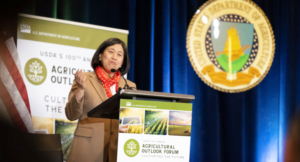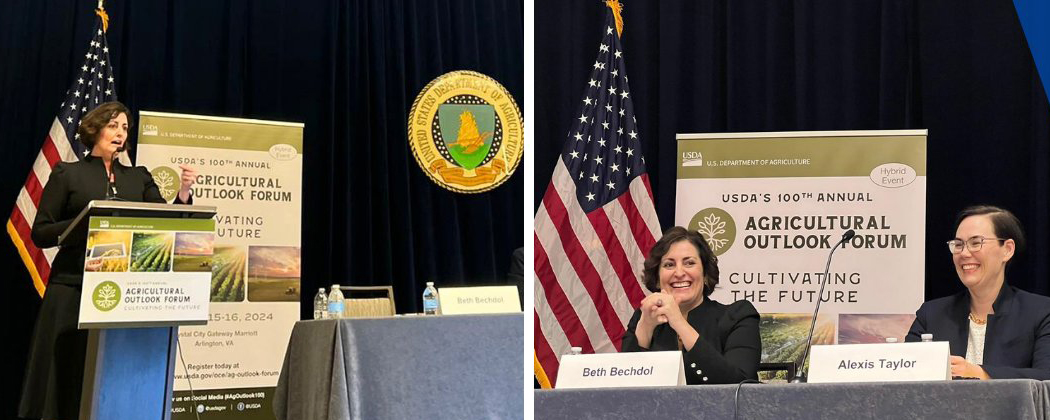Importance of Trade, Relationship-Building Discussed as Leaders Gather in Washington

U.S. Trade Representative Katherine Tai spoke about free trade agreements at USDA’s 2024 Ag Outlook Forum, held Feb. 15-16 in Washington, D.C.
Agricultural trade – including topics tied closely to the work of U.S. Wheat Associates (USW) – was a major focus during the 100th annual Ag Outlook Forum hosted Feb. 15-16 by USDA in Washington, D.C.
A panel discussion titled, “100 Years of U.S. Ag Trade; A Century of Growth, Innovation, and Progress” was the highlight of the first day. The panel featured speakers from USDA, the United Nations (UN) Food and Agriculture Organization (FAO), and the Peterson Institute for International Economics.
History of Free Trade
USDA Senior Economist Sharon Sydow presented a crash course on the history of trade liberalization. Her subjects ranged from the General Agreements on Tariffs and Trade (GATT) to the creation of the World Trade Organization (WTO) and expansion of bilateral and multilateral trade agreements.
“The historical perspective of her presentation showed the exponential growth in U.S. agriculture trade through these progressive measures,” said forum attendee USW Director of Trade Policy Peter Laudeman.
Global Food Assistance
Also on the first day, Food and Agriculture Organization of the United Nations (FAO) Deputy Director General Beth Bechdol pointed out that agricultural trade is critical to the nourishment and development of poor, food insecure countries. Looking to the future, Bechdol said she sees successful American agricultural trade as an essential component for fighting global hunger and poverty.
Importance of Trade
On the second day, several speakers highlighted the importance of agricultural trade. A keynote address by U.S. Trade Representative Katherine Tai addressed some of the recent free trade accomplishments that have eliminated barriers to agricultural trade. Additionally, she committed to continue fighting for American farmers in places where trade barriers remain.
Carlson Addresses the Philippines, Relationships
MaryKay Carlson, U.S Ambassador to the Philippines, was also in attendance and spoke on the importance of relationships for agricultural trade success. She highlighted the long-standing ties between the U.S. and the Philippines. Those ties have allowed that country to become the No. 2 export destination for U.S. wheat. Carlson noted the consistent quality of U.S. wheat and characteristics that make Filipino flour millers and bakers regular customers.
Relationship-building has also been a big part of the success the U.S. has enjoyed in the Philippines. USW recently helped the Filipino flour milling industry achieve renewed anti-dumping duties on imported Turkish flour to defend and maintain this trading relationship with U.S. wheat farmers.


